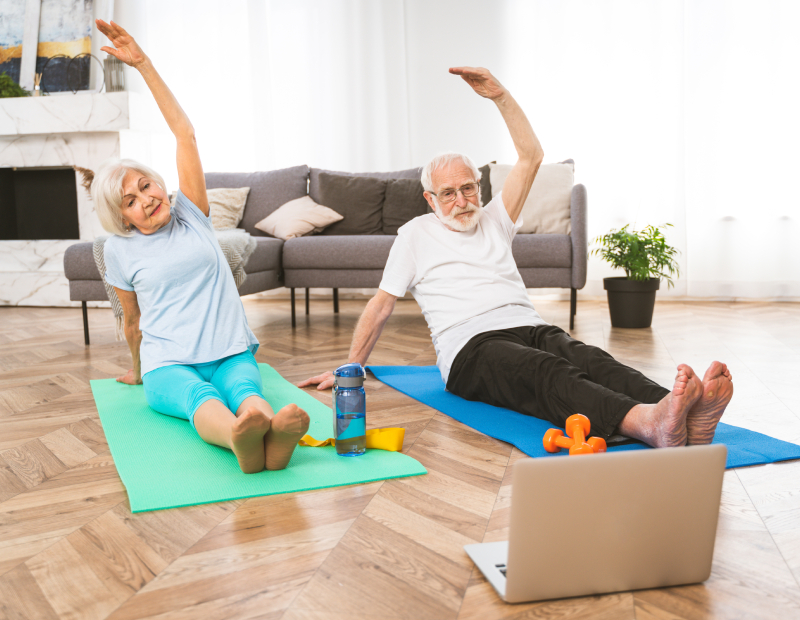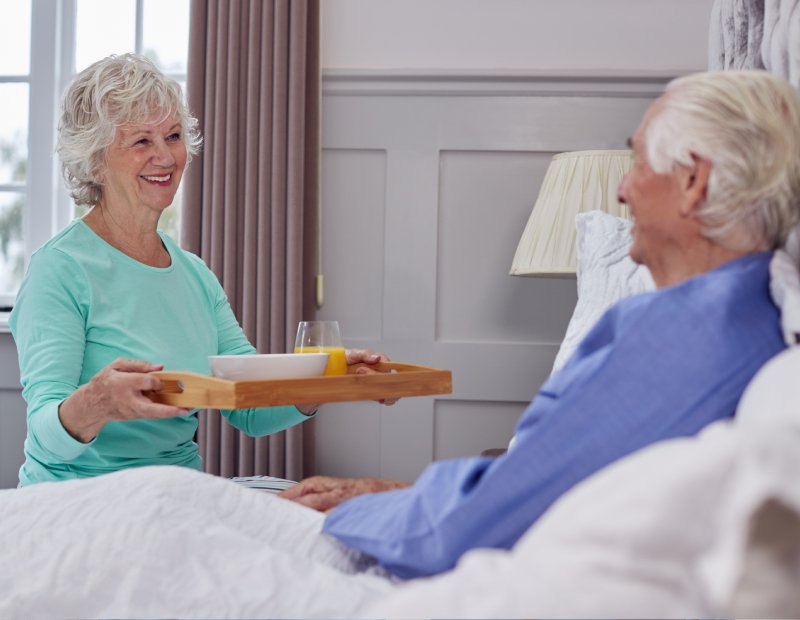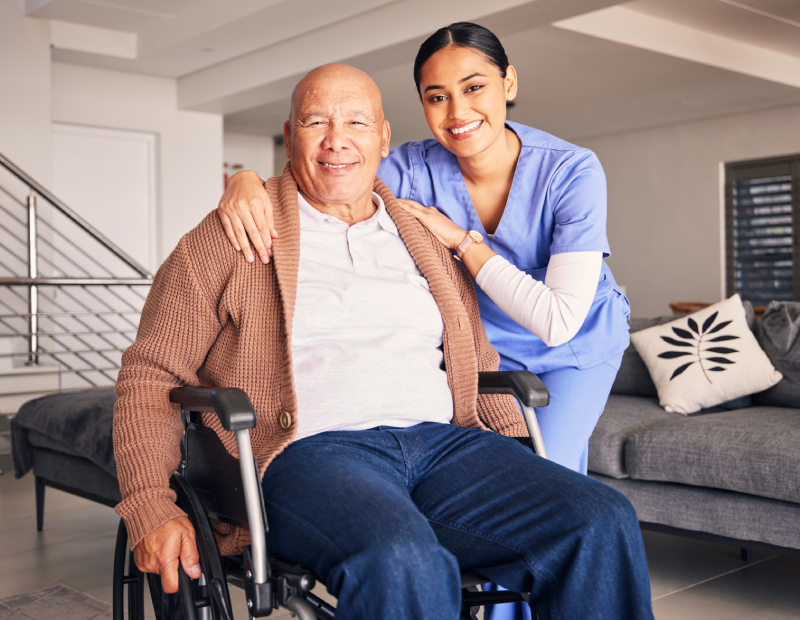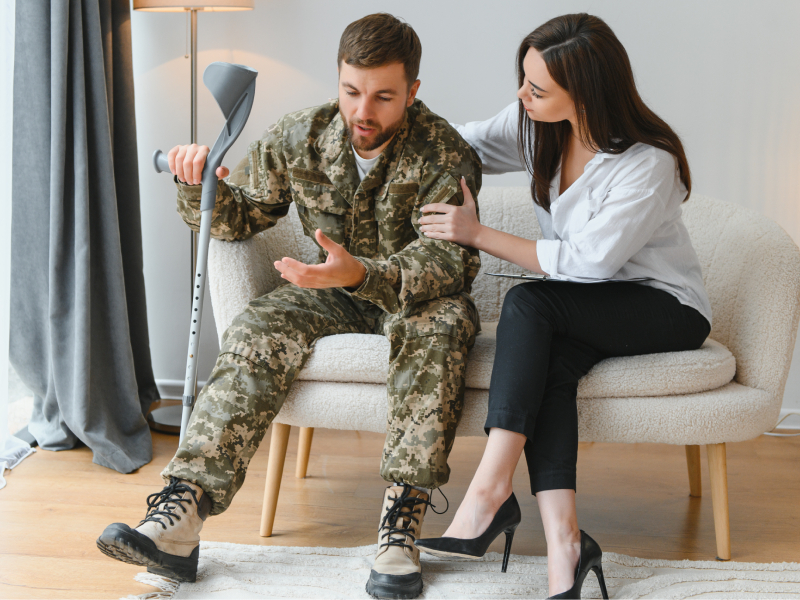Understanding ADLs
Basic ADLs vs. Instrumental ADLs
What are activities of daily living (ADLs) and why are they important? ADLs encompass a broad spectrum of tasks essential for maintaining one’s health and well-being. These tasks can be divided into two categories: Basic ADLs and Instrumental ADLs.
Basic ADLs involve fundamental self-care tasks:
- Eating: The ability to feed oneself.
- Bathing: Maintaining personal hygiene.
- Dressing: Putting on and taking off clothing.
- Toileting: Managing bathroom needs independently.
- Transferring: Moving from one position to another, such as from a bed to a chair.
- Continence: Controlling bladder and bowel functions.
Instrumental Activities of Daily Living (IADLs) are more complex and require higher-level cognitive and physical functioning. These activities are crucial for maintaining independence:
- Managing finances: Handling money, paying bills.
- Medication management: Taking prescribed medications.
- Cooking and meal preparation: Planning and preparing meals.
- Housekeeping: Cleaning, doing laundry.
- Shopping for groceries: Buying necessities.
- Using transportation: Driving or arranging transport.
- Communication: Using the phone or other means to stay connected.
For further understanding, you might want to explore our article on instrumental activities of daily living (iadls).
Significance of ADLs
Activities of daily living are vital indicators of an individual’s ability to live independently. They provide a benchmark for assessing a person’s functional status. Healthcare providers measure how well individuals perform ADLs to determine the level of support they may need (Cleveland Clinic).
The ability or inability to perform ADLs can:
- Impact Quality of Life: Being able to manage daily tasks independently enhances one’s quality of life.
- Affect Health and Well-being: Difficulty in performing ADLs could indicate underlying health problems.
- Determine Care Needs: Understanding ADL capacities helps tailor care plans to meet specific needs. For example, in Gold River, CA, we provide full-service non-medical in-home care for Veterans to support their ADL requirements.
Healthcare providers utilize tools such as the Katz Index of Independence in Activities of Daily Living (Cleveland Clinic) to evaluate the ability to perform basic ADLs. This scale assesses six categories, giving one point for each task performed independently:
| ADL Category | Independence Score |
|---|---|
| Bathing | 0 or 1 |
| Dressing | 0 or 1 |
| Toileting | 0 or 1 |
| Transferring | 0 or 1 |
| Continence | 0 or 1 |
| Feeding | 0 or 1 |
The higher the total score, the greater the individual’s independence. For more insights on maintaining independence, visit our article on how activities of daily living (adls) keep seniors independent.
Understanding and evaluating ADLs help us recognize the support needed to enhance the quality of life and maintain independence. Knowing these needs allows for better planning and implementation of care strategies, ensuring that individuals, especially Veterans, receive the dedicated care required.
Impact on Quality of Life
Connection to Health and Well-being
Activities of Daily Living (ADLs) are central to maintaining health and well-being. Basic ADLs include eating, bathing, dressing, grooming, and other fundamental tasks required to stay alive and well (Cleveland Clinic). These daily activities ensure that individuals can manage their essential physical needs, contributing to their overall health status.
Healthcare providers use ADL assessments to evaluate a person’s ability to conduct these activities without assistance, which can indicate the level of care they require. For example, the Katz Index of Independence in ADLs is a widely-used tool that helps gauge whether individuals can manage these tasks on their own or if they need support (Cleveland Clinic). For veterans, these assessments are often crucial in determining the need for non-medical in-home care services.
| ADL Task | Importance | Indicators of Difficulty |
|---|---|---|
| Bathing | Hygiene and skin health | Frequent infections, poor odor |
| Dressing | Proper body temperature regulation | Inappropriate clothing for weather |
| Eating | Nutritional intake | Weight loss, malnutrition |
| Transferring | Mobility and independence | Risk of falls, injuries |
Understanding how well an individual can perform these activities is essential for maintaining their health and prescribing appropriate care plans. Comprehensive guides to non-medical home care in Sacramento often emphasize the importance of such evaluations.
Effects on Independence
The ability to perform ADLs directly impacts an individual’s independence. For veterans and seniors, maintaining the capability to carry out these tasks without assistance can significantly enhance their quality of life. Independence in ADLs allows individuals to live with dignity and reduces the need for extensive caregiving. For instance, how activities of daily living (ADLs) keep seniors independent discusses how managing these activities can support a senior’s self-sufficiency.
Instrumental Activities of Daily Living (IADLs) include managing finances, cooking, and doing laundry—tasks that are crucial for living independently (Cleveland Clinic). Although basic ADLs focus on essential self-care, IADLs require more advanced skills that support overall well-being. Understanding the difference is crucial in senior care, as discussed in detail in our article on ADLs vs. IADLs: understanding the difference in senior care.
| IADL Task | Importance | Indicators of Difficulty |
|---|---|---|
| Managing Finances | Financial independence | Missed payments, inability to budget |
| Cooking | Nutritional health | Poor diet, reliance on pre-packaged food |
| Housekeeping | Living environment quality | Untidy home, unsanitary conditions |
For veterans, ensuring independence in both ADLs and IADLs can be critical. A well-rounded care plan that incorporates support for these activities can lead to better health outcomes and improved quality of life. Learn more about how Bravo Personal Care Services ensures quality care for seniors and veterans.
By recognizing and addressing the impact of ADLs on health and independence, services like Bravo Personal Care in Gold River, CA, provide valuable support to veterans in need of non-medical in-home care, ultimately enhancing their quality of life.
ADL Assessment and Support
Effectively managing activities of daily living (ADLs) is crucial for enhancing the quality of life for veterans. At Bravo Personal Care in Gold River, CA, we prioritize detailed ADL assessment and personalized support to ensure that our clients maintain their independence and well-being. Here’s how we evaluate and support ADLs:
Healthcare Provider Evaluation
Healthcare providers play a pivotal role in assessing ADLs. Evaluations are conducted using multiple methods such as direct observation, input from caregivers, and self-reporting. These comprehensive assessments enable healthcare providers to determine the level of support required for each individual.
| Assessment Method | Description |
|---|---|
| Direct Observation | Observing the individual perform tasks |
| Caregiver Input | Gathering information from caregivers |
| Self-Reporting | Individuals report on their capabilities and needs |
Our healthcare providers use these evaluations to recommend appropriate support options, ensuring the safety and well-being of our clients.
Tailored Care Plans
Based on the evaluation results, we develop tailored care plans that address the specific needs of each veteran. Assisted living communities often conduct wellness reviews to assess individual capabilities and craft care plans that support areas requiring assistance while preserving personal capabilities (Pavilion at Great Hills). This approach fosters a sense of control and continuity in the individual’s lifestyle.
| Key Components | Benefits |
|---|---|
| Personalized Care Plans | Address unique needs and preferences |
| Regular Wellness Reviews | Adapt care plans based on changing needs |
| Focus on Independence | Enhance physical health and self-esteem |
By adopting this personalized approach, we ensure that each veteran receives the right level of support to maintain their independence and well-being.
Support Systems
Robust support systems are essential for veterans who need assistance with ADLs. At Bravo Personal Care, we provide various support services to help veterans perform ADLs effectively. These services include:
- Non-medical home care: Offering support with basic ADLs such as bathing, dressing, and eating, which are necessary for physical survival and well-being (ERISA Attorneys).
- Instrumental activities of daily living (IADLs): Assistance with more advanced tasks that require complex thinking and organization skills, like managing finances, cooking, and navigating spaces outside the home.
For more detailed information on the support systems available, you can read our comprehensive guide to non-medical home care in Sacramento.
| Support Service | Description |
|---|---|
| Non-medical Home Care | Support with basic ADLs |
| IADL Assistance | Help with advanced tasks such as managing finances |
| Regular Monitoring | Frequent evaluations to adapt support as needed |
Effective support systems ensure that veterans can perform daily activities with ease, maintaining their independence and enhancing their quality of life.
For more information on how our assessments and support systems can help your loved ones, explore our articles on how non-medical home care promotes senior independence and signs your loved one might need professional home care.
Katz Index and ADL Evaluation
Understanding and evaluating the ability of individuals to perform Activities of Daily Living (ADLs) is crucial for assessing their need for support and enhancing their quality of life. The Katz Index of Independence in Activities of Daily Living, commonly known as the Katz ADL Scale, is a widely used tool for this purpose.
Basic ADL Assessment
The Katz Index focuses on six basic ADLs:
- Bathing
- Dressing
- Toileting
- Transferring
- Continence
- Feeding
Each activity is assessed to determine if an individual can perform it independently. A point is given for each task that can be completed without assistance (Cleveland Clinic). This assessment helps healthcare providers and caregivers to identify areas where support is needed.
Scoring and Independence Levels
The Katz ADL Scale assigns a score ranging from 0 to 6, with each point corresponding to an independent activity:
| Activity | Scored Point |
|---|---|
| Bathing | 1 |
| Dressing | 1 |
| Toileting | 1 |
| Transferring | 1 |
| Continence | 1 |
| Feeding | 1 |
A higher score indicates greater independence. For example, a score of 6 signifies full independence in basic ADLs, while lower scores indicate varying levels of dependence and the need for more support (Cleveland Clinic).
Evaluating these scores helps us customize care plans that fit the individual’s needs, improving their overall quality of life. Healthcare providers typically use different assessment methods such as direct observation, caregiver input, and self-reporting to ensure a comprehensive evaluation (Cleveland Clinic).
For a more thorough understanding, the use of both the Katz ADL Scale and the Lawton Instrumental Activities of Daily Living (IADL) Scale can provide a complete picture of an individual’s capabilities (NCBI Bookshelf). While the Katz Index focuses on basic ADLs, the Lawton IADL Scale evaluates skills necessary for independent living, such as food preparation, housekeeping, and laundry.
ADL assessments are a critical component in non-medical in-home care, helping to maintain and improve the well-being of individuals, including veterans in need of specialized care. By identifying and addressing specific needs, we can offer tailored care plans and support systems that enhance an individual’s health, self-esteem, and overall life satisfaction.
To learn more about specific services and benefits related to non-medical in-home care, check out our articles on comprehensive guide to non-medical home care in Sacramento and how Bravo Personal Care Services ensures quality care for seniors.
For veterans or their families looking for specific support, understanding the Veterans Aid & Attendance Program: Benefits and How to Apply can provide necessary guidance and aid.
Importance of ADL Monitoring
Monitoring the activities of daily living (ADLs) is crucial in maintaining the well-being and independence of individuals, especially veterans and seniors receiving non-medical in-home care. By consistently assessing ADLs, we can recognize changes over time and address factors influencing these daily activities. Understanding what are activities of daily living (ADLs) and why are they important? is key in providing effective care.
Recognizing Changes Over Time
Recognizing changes in ADLs over time helps us identify early signs of declining health or increasing dependency. ADL assessments can reveal subtle shifts that might indicate the need for further medical evaluation or adjustments in care plans. For instance, the inability to ambulate increases the risk of falls, which are associated with increased mortality rates, especially for individuals aged 65 and older. Regular ADL assessments enable us to take proactive measures to prevent falls and other complications.
| ADL Component | Significance of Monitoring |
|---|---|
| Mobility | Reduces fall risk, assesses balance |
| Personal Hygiene | Detects issues with dexterity or cognitive function |
| Dressing | Indicates changes in physical or cognitive abilities |
Regular monitoring also helps in decision-making regarding the need for rehabilitation or whether an individual may benefit from placement in a skilled nursing or long-term care facility (NCBI Bookshelf). We include consistent evaluation of ADLs in our care plans to ensure veterans receive the support they need.
Factors Influencing ADL Abilities
Several factors can influence an individual’s ability to perform ADLs. Recognizing these factors helps us tailor our care and support to meet specific needs.
- Physical Health: Conditions such as arthritis, stroke, or chronic pain can hinder mobility and other ADLs.
- Cognitive Health: Dementia and other cognitive impairments significantly impact an individual’s capacity to manage daily activities independently.
- Environmental: Unsafe home environments with poor lighting, lack of grab bars, or clutter can increase the risk of accidents.
If an individual is unable to perform at least two ADLs, they may qualify for long-term care benefits, which necessitates a thorough understanding of how non-medical home care promotes senior independence (ERISA Attorneys).
To improve ADL abilities, we recommend incorporating strategies such as tailored exercise programs, environmental modifications, and cognitive support into care plans. Understanding the role of non-medical home care and its impact on ADLs can lead to enhanced quality of life for veterans.
For further information on ADLs and their significance in enhancing daily functioning, visit our guide on how activities of daily living (ADLs) keep seniors independent. To understand the difference between ADLs and IADLs, check out our article on ADLs vs. IADLs.
ADLs in Everyday Life
Role in Daily Functioning
Activities of Daily Living (ADLs) encompass essential tasks that individuals perform regularly to maintain personal well-being and independence. These tasks include bathing, dressing, toileting, transferring, eating, and continence. These fundamental activities form the basis of daily self-care and are crucial for one’s ability to function independently within their home environment.
ADL Tasks and Their Importance:
- Bathing: Ensures personal hygiene and prevents skin infections.
- Dressing: Enables proper attire for varying daily activities.
- Toileting: Maintains personal cleanliness and dignity.
- Transferring: Facilitates safe movement from one position to another.
- Eating: Essential for nutritional intake and health maintenance.
- Continence: Maintains personal dignity and hygiene.
The ability to perform these tasks independently often determines the quality of life and overall well-being of individuals. When individuals, such as our veterans, face challenges in executing these activities due to physical or cognitive impairments, it significantly impacts their daily functioning and creates a need for supportive care services.
Enhancing Quality of Life
The inability to perform ADLs independently can lead to unsafe conditions and a decline in the quality of life (NCBI). By providing targeted support and assistance with these essential tasks, Bravo Personal Care in Gold River, CA, ensures that veterans live with dignity and maintain their daily routines effectively.
Impact of ADL Assistance:
- Improvement in Safety: Reduces risks of falls and injuries.
- Enhanced Hygiene: Promotes overall health and prevents infections.
- Social Well-being: Encourages social interaction and reduces isolation.
- Independence: Supports autonomy in daily activities, boosting self-esteem.
Table: Significance of ADLs in Enhancing Quality of Life
| ADL Task | Impact on Quality of Life |
|---|---|
| Bathing | Prevents skin conditions, enhances confidence |
| Dressing | Enables self-expression, prepares for social engagement |
| Toileting | Maintains dignity, avoids health complications |
| Transferring | Ensures mobility, prevents falls and related injuries |
| Eating | Provides necessary nutrition, sustains physical health |
| Continence | Maintains personal hygiene, preserves self-respect |
Individuals who struggle with ADLs often need personalized care plans to address their unique needs. Our team at Bravo Personal Care tailors these plans to each veteran, ensuring they receive the appropriate level of support. By regularly monitoring changes in ADL capabilities, we identify when adjustments are necessary and provide continuous, comprehensive care (Cleveland Clinic).
For more insights on how ADLs play a crucial role in the lives of seniors and veterans, explore our articles on how activities of daily living (adls) keep seniors independent and instrumental activities of daily living (iadls): improving quality of life for seniors. Understanding the distinction between ADLs and IADLs is vital in senior care, which you can further delve into in our article on adls vs. iadls: understanding the difference in senior care.
By prioritizing ADLs, Bravo Personal Care enhances the overall quality of life for veterans, enabling them to live independently and with greater satisfaction.




